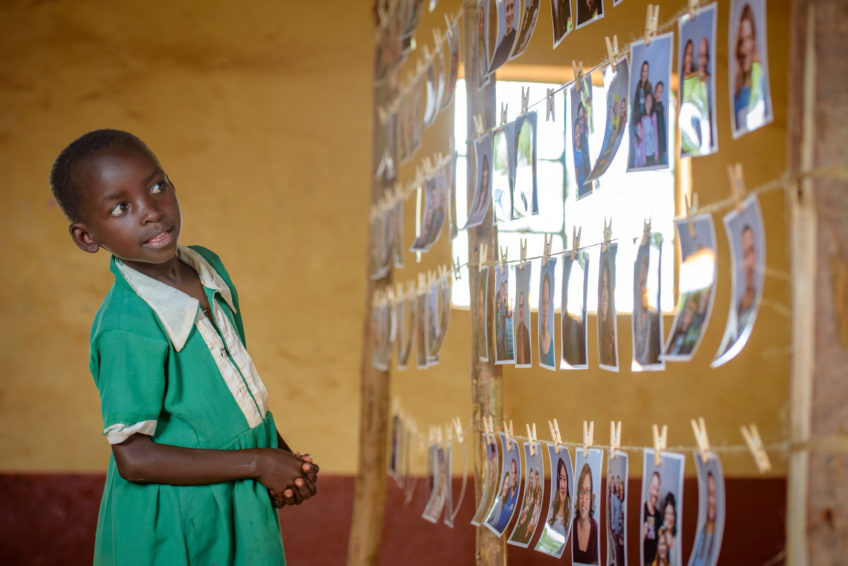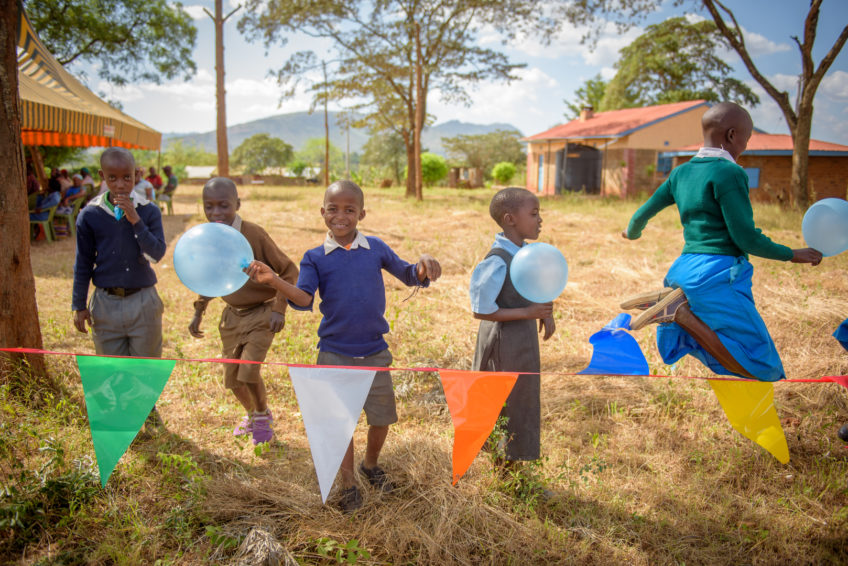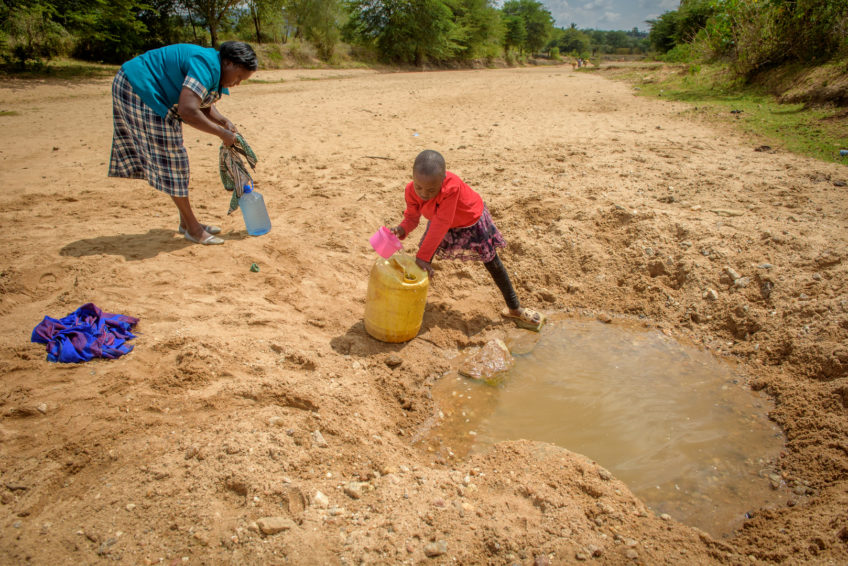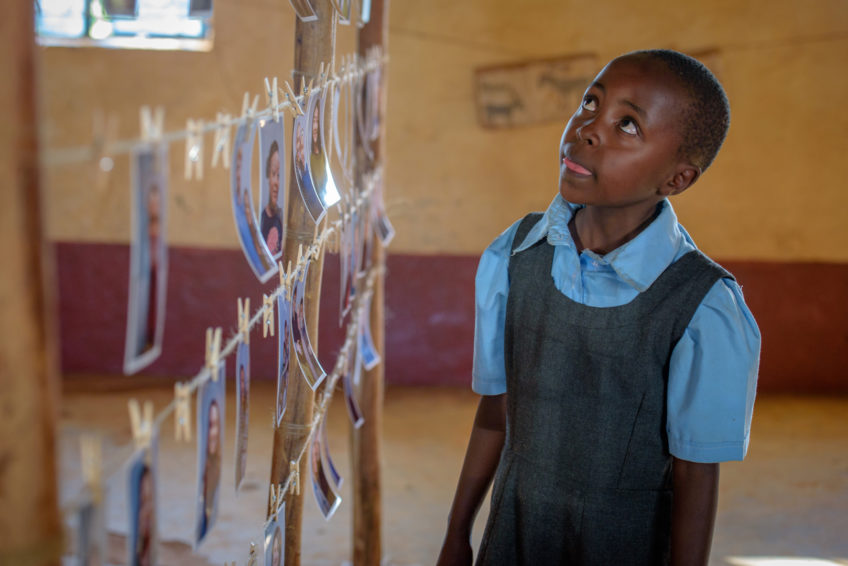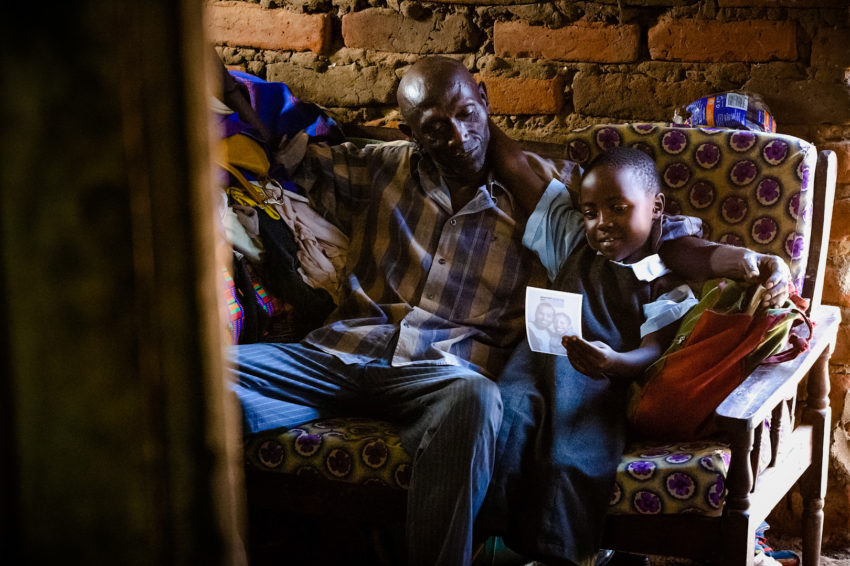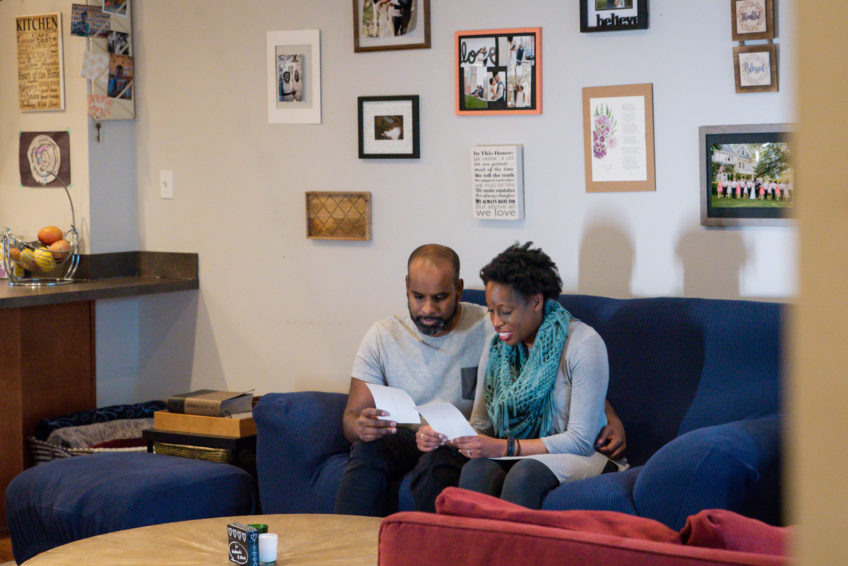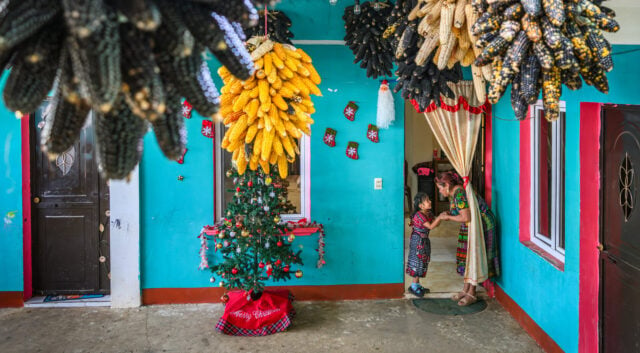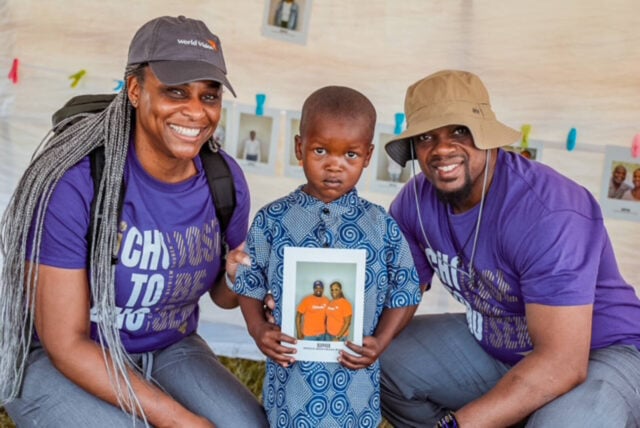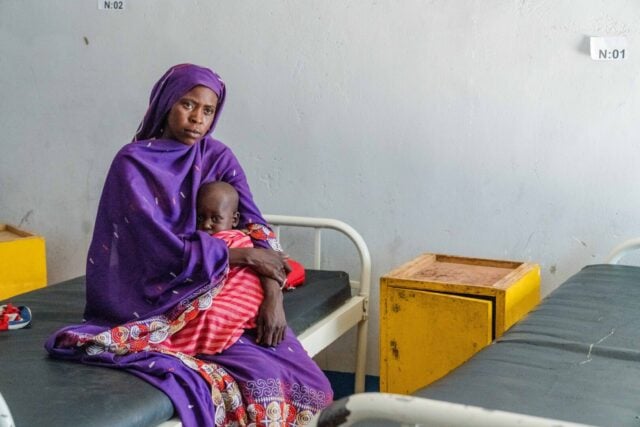Over our nearly 70-year history, we’ve seen how lives change when a child is empowered — when they advocate for themselves and their community, speaking out against abuses like child marriage, child labor, and violence, and speaking up for the right to basics like education, clean water, and opportunity. This year, we began to empower children with another choice. For the first time ever, the power to choose a sponsor is in the child’s hands.
“Will I be chosen?” “What if nobody chooses me?” Questions like these are asked by kids around the world who are waiting to be sponsored.
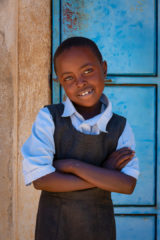
It had been a year and seven months since Ndinda Kinguuthe, a 7-year-old girl in Mwala, Kenya, had registered for sponsorship. She’d gotten her photo taken, her family met with World Vision staff, and she was told that someone in a land she couldn’t imagine would choose her as their sponsored child. And then she waited.
Kids who haven’t yet been connected with sponsors still benefit from our work in their communities, because the monthly gifts of sponsors are pooled to fund programs that lead to positive changes for everyone. In fact, because of our community-focused solutions, for every child you help, four more children benefit, too. But without a sponsor, kids like Ndinda miss out on a relationship that can be profoundly life-changing.
In her 14 years working for World Vision in Kenya, Winfred Mukonza, 38, has seen the power of sponsorship for all children. But she’s also sat with children and their families who wonder why no one is choosing them.
“They’ve been wondering, ‘What is happening? Why can’t I get someone? What is wrong with me?’” says Winfred. She and her staff try to encourage the children: “Keep praying to God and be patient; you will one day get your sponsor.”
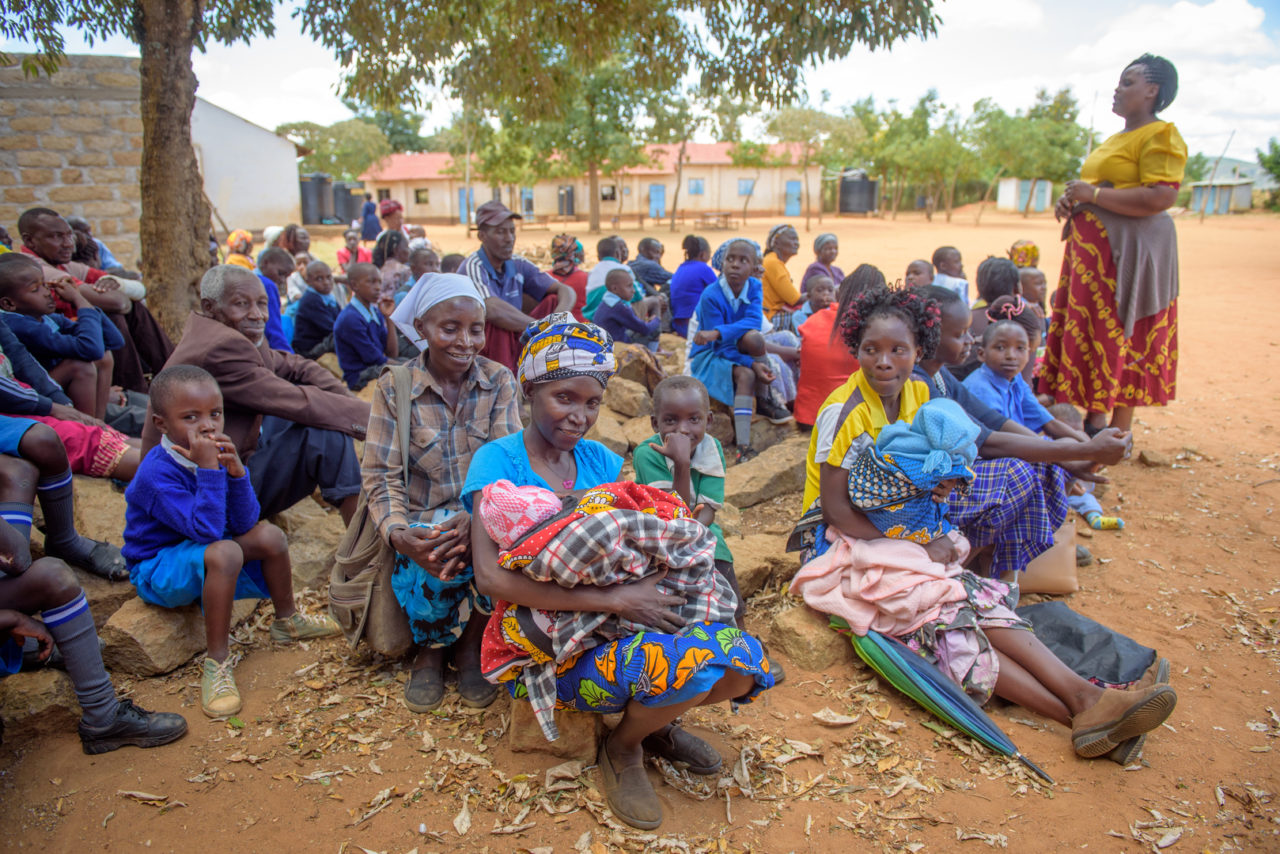
The children of Mwala want to be chosen because it means someone sees them and loves them. It’s the same for you and me. We want to be chosen, too. Even when we feel sure of God’s love for us, there is immense power in being chosen by a friend, a colleague, a mentor — or even someone on the other side of the world. Having someone believe in us can change everything.
After decades of sponsorship where children wait for a sponsor to pick them, World Vision decided to give kids the opportunity to choose their own sponsors — starting in Mwala.
‘Something that has never been done before’
On a Sunday morning in late February 2019, congregants arrived at Soul City Church, which sits a dozen blocks from the iconic Willis Tower in downtown Chicago. Photo booths throughout the building hinted that this service would be something out of the ordinary.
Soul City has been a World Vision partner for eight years, but on this day, co-lead pastor Jeanne Stevens joined World Vision in inviting her congregation to say yes to a transformative sponsorship relationship — with a twist. “We want to do something that has never been done before,” Jeanne shared. “Instead of just wishing and hoping and waiting for a sponsor to pick them … we want to empower [the kids] to make the choice.”
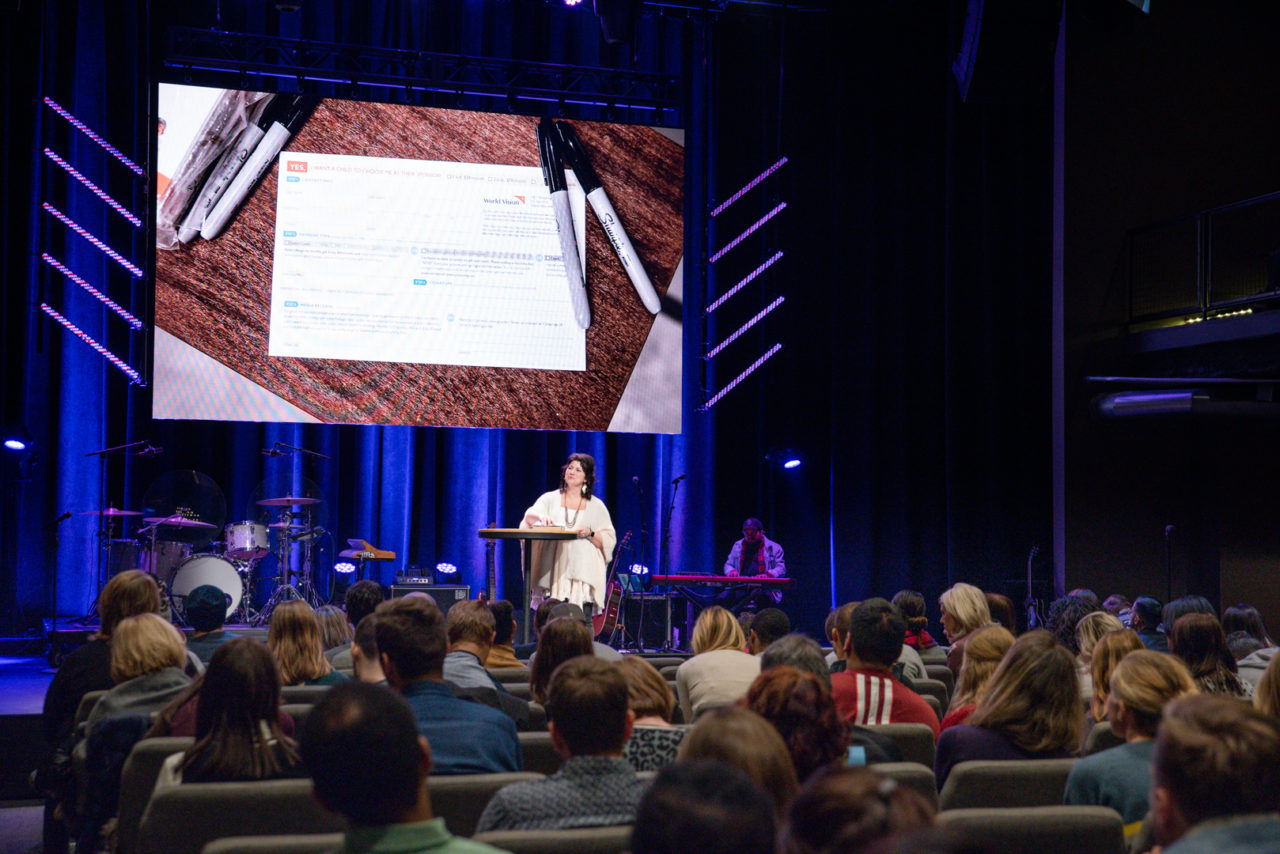
Jeanne explained that photos would be taken of families and individuals who wanted to sponsor a child, and the photos would be sent to Mwala, where, for the first time ever, the children in the community would choose their sponsors. At the following Sunday’s service, people at Soul City would find out which child had chosen them.
“Whether you live here in Chicago or you live in Mwala, Kenya, every single person wants to be chosen,” Jeanne said to an enthralled congregation. “I want to be chosen. You want to be chosen. You want to be seen. You want to be loved. You want to be reminded that you are worthy of love.”
Every single person wants to be chosen.—Jeanne Stevens
In the sanctuary, Chrissy and Regis Storey exchanged a look. They were intrigued, and the idea of needing to be chosen resonated with them. Chrissy, 29, had been sponsoring a child for seven years, since a friend had run a marathon with Team World Vision and inspired her to sign up. With a low-income job at a nonprofit, the $39 monthly gift was, she said, a bit of a sacrifice. But troubled by the transitory nature of many modern relationships, she found the long-term commitment of sponsorship to be “good soul work.”
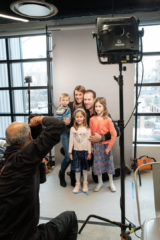
Now married, Chrissy had recently finished graduate school; and Regis, 35, is working as a therapist. They live in a one-bedroom basement apartment in their friends’ house. Finances still aren’t great, but Chrissy remembers her mom’s words growing up: “No matter what, the Lord’s given us all we have. So, whether it feels like we have a lot or it feels like we have a little, we’re gonna give back to him.”
“Should we?” whispered Chrissy and Regis to each other in the dimly lit sanctuary. “Okay,” they decided, agreeing to sponsor two more children.
That day, Chrissy and Regis — and hundreds of others from Soul City — signed up, empowering hundreds of children in Mwala to choose them as sponsors.
After the service, families and individuals streamed into the lobby. As Chrissy and Regis stood in line to have their photo taken, Chrissy was nervous. She says it felt “vulnerable and scary to put yourself out there. We were like, ‘I hope someone picks us.’” She thought of the children waiting to be chosen and drew inspiration from them. “I can be brave and put myself out there if they can sit and wait and wonder, ‘Will someone come?’”
Being brave has become a theme for Chrissy. She is not yet working in her field of study and wonders if friends and family are disappointed in her. Due to family conflict, she’s not in touch with her dad, who doesn’t even know that she earned a master’s degree. She’s wrestling through hurt, healing, and forgiveness.
During the following week of waiting, other friends who had signed up empathized with the feeling of vulnerability. “What if nobody chooses us? What if nobody wants us? What if our pictures are just left down there?” they asked each other.
The power to choose in a child’s hands
More than 8,000 miles away, the Soul City photos were downloaded and printed. Inside a tin-roofed schoolroom, in the rural community of Mwala, east of Nairobi, the photos were hung for the children to see.
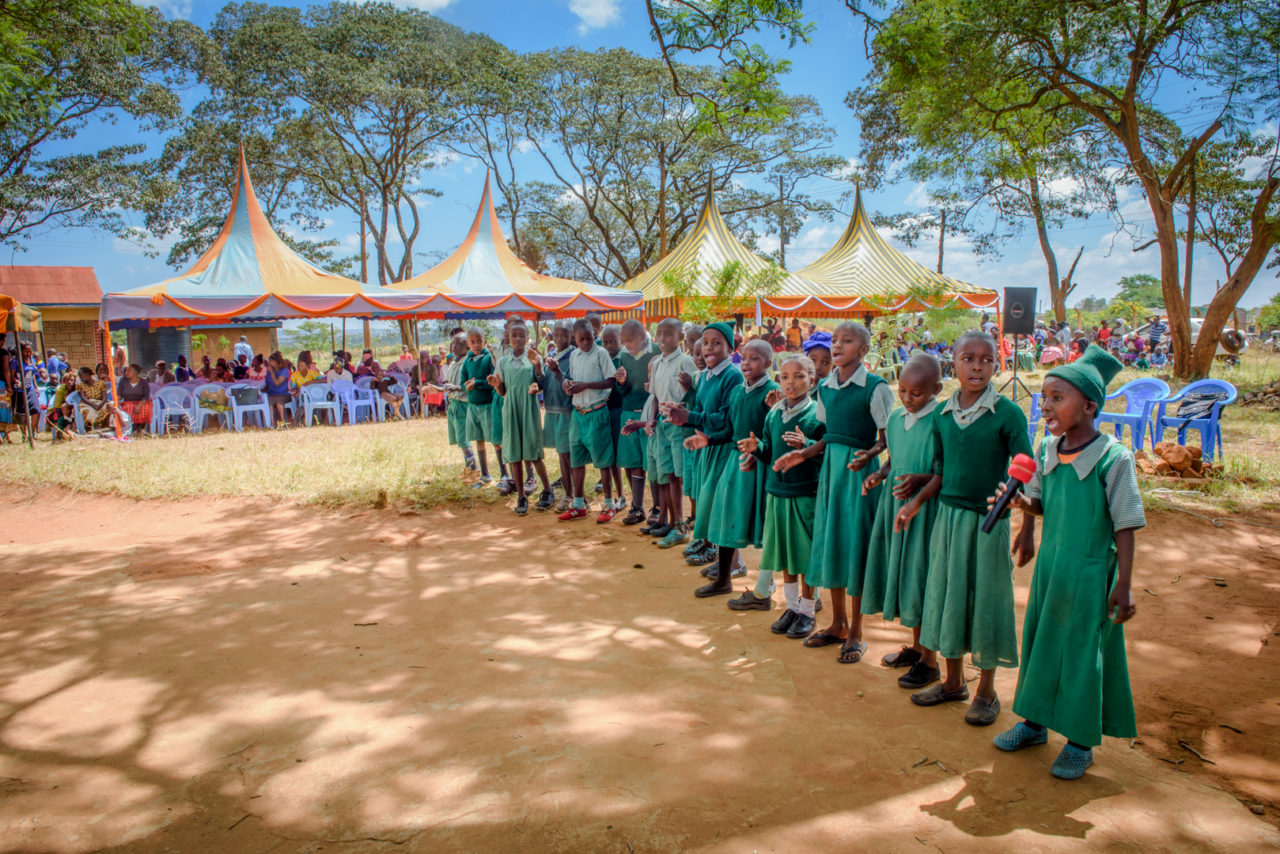
In this community of 40,000 people, the freedom to choose is an unfamiliar luxury. Families mostly make their living through farming — growing mangoes, oranges, legumes, and grains such as corn. But drought threatens their livelihood, and in this dry season, most families have to walk more than two hours to find water. Nearly 80% of families are unable to provide well for their children, who are accustomed to a life of essential chores, little free time, and few options. “They are not used to choosing,” says Winfred. “They are not used to making decisions. Some of them are doing this for the first time.”
They are not used to making decisions. Some of them are doing this for the first time.—Winfred Mukonza
As the sun beat down on a warm day, children in their school uniforms gathered under tents for a community event featuring games, singing, and spiritual encouragement — and the invitation to choose their own sponsors. The children relished this opportunity, beaming as they studied the faces and smiles in the photos before making their choices. They walked away treasuring the photo they’d selected. For children who had been waiting for a sponsor for years, Winfred says, “that is a prayer answered.”
A sponsor at last
After her year-and-seven-month wait for a sponsor, Ndinda was delighted when it was her turn to choose. Slowly scanning the faces, Ndinda was captivated by Chrissy’s beautiful face and warm smile. She looked familiar, and she knew immediately that this was who she wanted as her sponsor. “I was very happy because she looked like my mother,” Ndinda says.
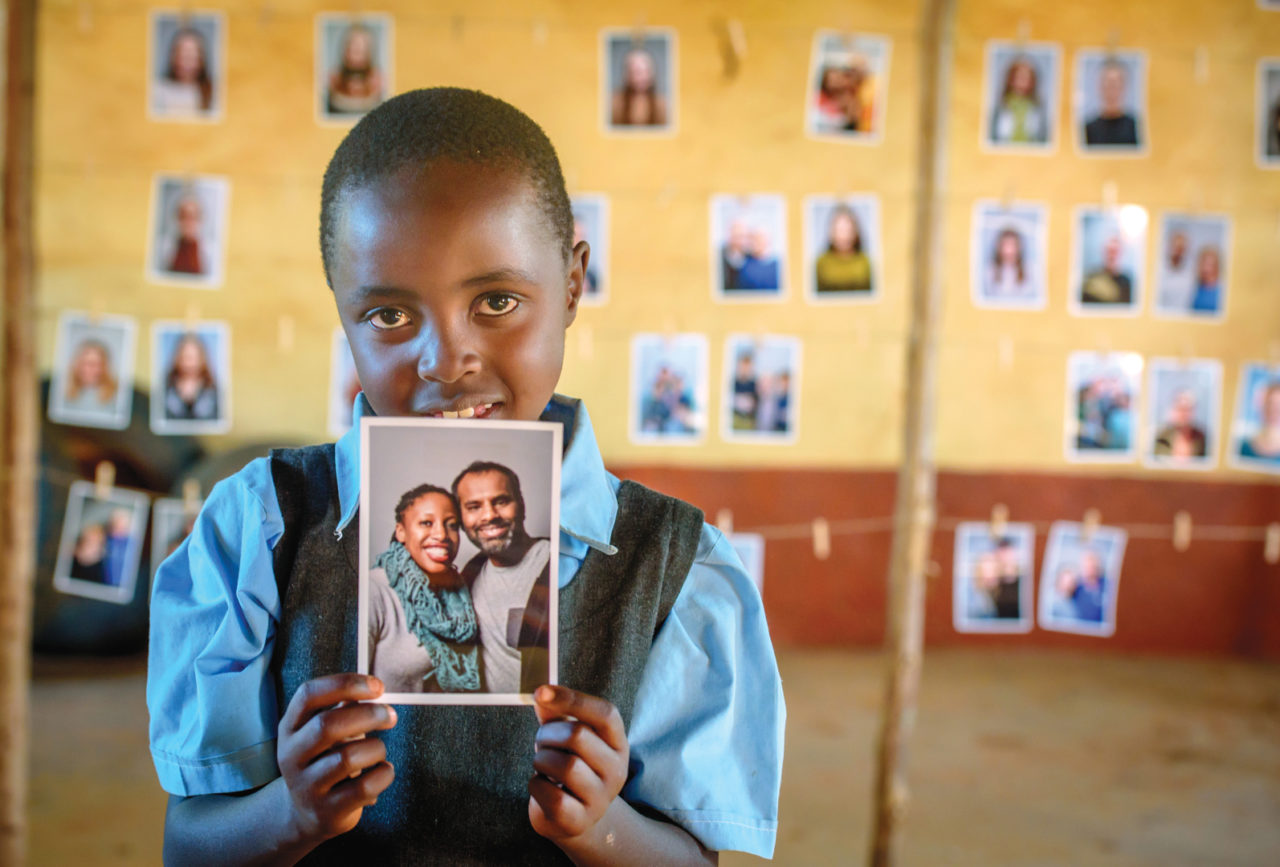
Ndinda’s mother, Miriam, had died three years ago after a brief battle with meningitis. Miriam had been the family’s main breadwinner, attending nursing school in Nairobi and teaching part-time to earn money.
The death of her mother left Ndinda and her now 11-year-old sister, Mercy, in the care of their grandparents, who eke out a living by selling fruit or the occasional goat or cow.
Ndinda sometimes joins her grandmother, Nthenya, on the long walk to dig for water in a dry riverbed. The water isn’t clean, and Ndinda often suffers from stomachaches and headaches. Despite her health issues, she excels at school, where she loves math and ranks high in her class. She eagerly raises her hand to answer her teacher’s questions and joins other classmates in snapping her fingers and shouting, “Teacher! Teacher!” in hopes that she’ll be called on.
School is important to her for a particular reason. She wants to be a doctor when she grows up “so that I can treat people” — people like her mother.
Ndinda is already demonstrating her gift of caring for others. She watches and plays with her 18-month-old cousin, Grace. She helps her grandmother by washing dishes and collecting firewood. And after school, she helps her grandparents sell fruit at their roadside stand. When she does find time to just be a kid, she enjoys games like jumping rope.
A large framed photo of her mother is one of Ndinda’s prized possessions, and now she treasures a photo of Chrissy and Regis too. She keeps it in a special box and takes it out every day. “When I look at the photo after school, I smile,” says Ndinda. “It makes me feel happy.”
A reminder of the Lord’s love
Back in Chicago, the Sunday after the first invitation, the Soul City congregation was invited to enter a room strung with Chosen envelopes. Each sponsor searched for their name and opened an envelope to see a photo of their new sponsored child, holding their photo. The room was filled with laughter, tears, and outbursts of excitement.
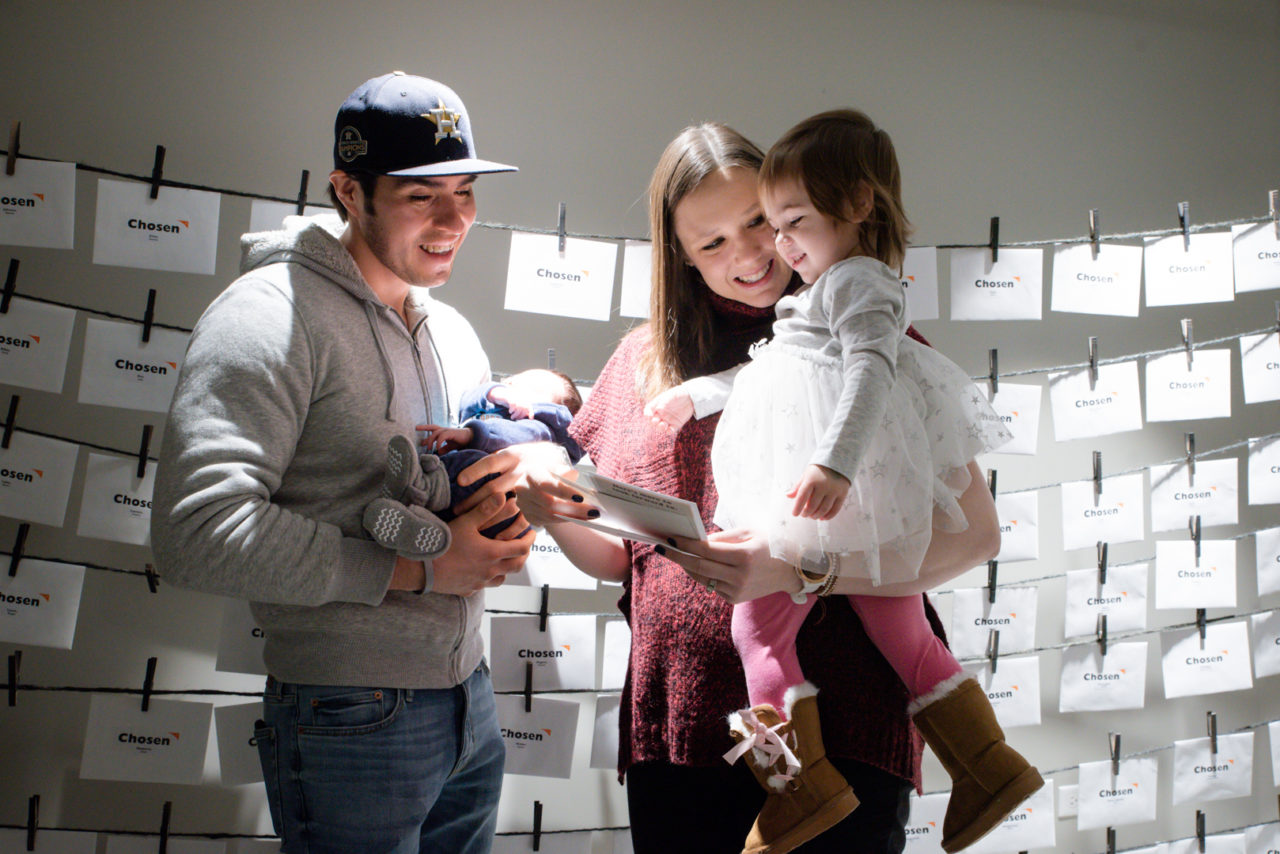
Tears flowed for Chrissy and Regis when they found out who’d chosen them — Ndinda and a 9-year-old girl named Rosemary Wausi. Watching a video of Rosemary choosing him, Regis, who was adopted from India when he was 3, was reminded him of being chosen as a child.
“Someone in a different country saw me. Looked at me just by a picture and [said], ‘I’ll give that person a chance.’ … My mom did the exact same thing,” he says. “She saw a picture of me and was like, ‘That kid with that bright smile, he’s worthy to have an awesome life.’”
Being chosen again, as an adult, left Regis emotionally raw and freshly aware of God’s love for him. “This is a good reminder of Jesus,” he says. “He does not, he has not forgotten me. He hasn’t forsaken me. He continues to love me.”
Chrissy experienced a similar expansive awareness of God’s love. She was in awe at being chosen, and while heartbroken that Ndinda was growing up without a mother, was deeply touched to reflect a motherly presence.
“For me to be a little taste, or a little reminder of who her mom was, to hopefully be another loving female in her life that reminds her of her mom — I feel really honored. It’s just so, so special,” says Chrissy.
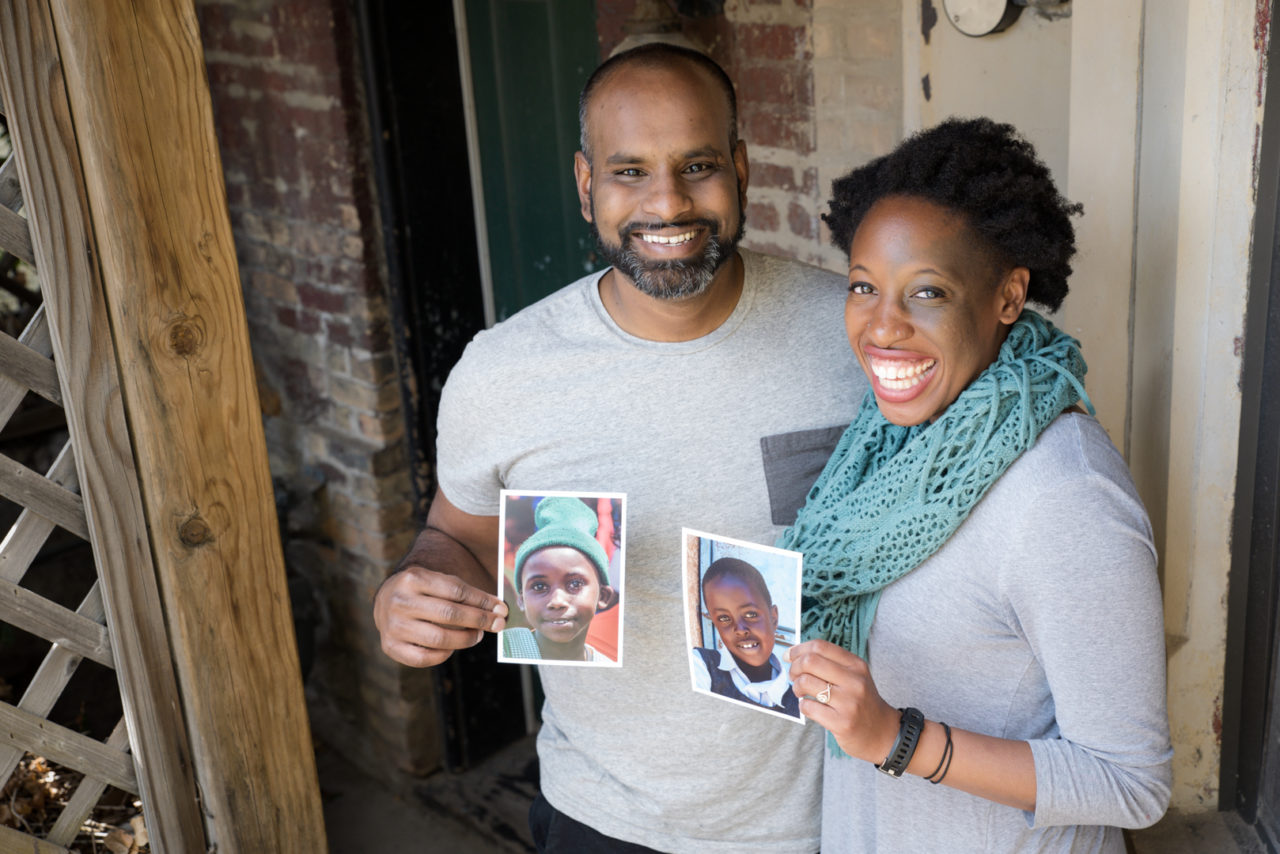
Chrissy was profoundly impacted by the experience of becoming vulnerable, of waiting, and then being chosen. “I feel braver. I feel like it’s like wind behind a sail, that I didn’t know that I really needed so much,” she says with tears in her eyes. Amid a season of uncertainty and waiting, being chosen reminded her of what really matters.
“[It’s] a really sweet reminder of the Lord’s love,” Chrissy says. “He’s not disappointed by me. He’s not far or distant. He’s like, ‘Hey, I’m going to love you through this little girl. She’s chosen you. I’ve chosen you. You are loved.’ Just as I am, without doing anything. I truly feel so blessed. It’s such a gift.”
I truly feel so blessed. It’s such a gift.—Chrissy Storey
Chrissy hopes and prays that Ndinda will have “more moments of feeling empowered, of feeling like she gets to choose, for her to know that she is believed in, too, to feel like she can do anything.”
And Ndinda prays for Chrissy. “I pray for a long life and for God to help her,” she says.
Exponential empowerment
Through sponsorship, Ndinda and the other children of Mwala are getting chances to use their voices, to make choices, and to create change. In our work in Mwala and around the globe, World Vision invites children to be involved in decision-making as we partner with their communities.
“We are asking what kind of life they want to see, what kind of projects they want to see in their community,” says Winfred. And the children of Mwala are speaking up. Many express a need for clean water closer to their homes. Some of them have asked for latrines for their schools and educational support for those who can’t afford the costs of school.
As much as Winfred wants the children and their families to have clean water and to be healthy, educated, and empowered, she also wants them to be loved.
Through sponsorship, whether it’s the child or the sponsor who chooses, “they have an extra friend in the family,” says Winfred. “It is very important that someone, somewhere, not in this country, loves them so much.”
It’s also important for us in America to know that someone, somewhere loves us so much, too.
“I truly want everyone to have this experience,” says Chrissy. “To know in this moment I am loved, and in this moment, I am chosen. It’s a sacred grounding.”
Click here to see the surprising reactions when these sponsors from Chicago are chosen by children in Mwala, Kenya.
Laura Reinhardt and Heather Klinger, World Vision staff in the U.S., contributed to this story.
